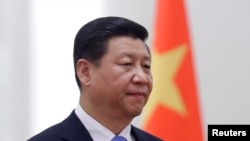Hello, and welcome to As It Is from VOA Learning English.
I’m Christopher Cruise in Washington.
Today on the program, we look at the results of this year’s campaign by China’s new leaders to reduce government waste and corruption.
But first, we report on charges against a well-known anti-corruption activist in China.
Corruption in China -- and what the country’s new leaders are doing about it. That is the subject of our program today, as you learn everyday American English with VOA.
China Charges Anti-Corruption Campaigner
Government lawyers in China have brought charges against a well-known anti-corruption activist. Caty Weaver tells us the activist -- Zu Zhiyong -- created a group that is trying to change the country’s political system.
Mr. Xu’s lawyer says the activist has been charged with “disturbing public order.” That is a common charge made against rights activists who try any kind of protest.
Mr. Xu created the New Citizens Movement. The group works within the system to cause political change.
The charge of “disturbing public order” comes months after Mr. Xu’s arrest in August.
The group has held small demonstrations to urge officials to publicly report about their wealth and property. It also calls on China’s citizens to fight corruption.
I’m Caty Weaver.
You are listening to As It Is, a program designed to help you learn to speak, read and write American English.
Now we go back to Christopher Cruise, who looks at efforts this year by China’s new leaders to stop government waste and corruption.
Thanks Caty.
China Makes Progress in Fight Against Corruption
In his first year in office, Chinese President Xi Jinping has taken unusual actions against government officials. Many people have praised his efforts to cut government waste and remove corrupt officials from their positions. But others say much more needs to be done.
Earlier this year, China tried Bo Xilai, a top political official. China broadcast the trial online for the first time. News agencies around the world reported on the trial.
China has also targeted state-owned companies in its campaign against corruption.
Hu Xingdou is an economist at the Beijing Institute of Technology. He says anti-corruption campaigns do not happen often in China, but they do happen.
Mr. Hu says that it is very rare for the ruling party to, in his words, perform surgery on itself and remove a tumor from its own body. But he says this campaign is not very different from those of the past.
Chinese government reports show the number of officials being investigated has not greatly increased from earlier years. But legal expert He Bing of the China University of Political Science and Law says the current campaign is stronger.
Mr. He says that up to 20 vice-ministers have been arrested this year. He says that, now, officials are not just talking about fighting corruption. He says they are arresting those they believe are corrupt.
The campaign has increased attention on officials who spend a lot of money. For example, in October, reporters noted plans by an official in Beijing to hold a large and costly three-day-long wedding for his son. Later, the official was removed from office.
Yuetan Street in Beijing is also known as Ministry Street because there are many government offices there. Sellers of costly Chinese alcohol say their sales have decreased by almost one third.
Over the past year, restaurants that often hold large parties paid for by government officials have suffered a decrease in business.
Economist Hu Zingdou says such economic problems are painful, but can be good for the country. He says it is not healthy for an economy to depend on government spending.
Mr. Hu says government spending is too high. He says official reports show the government spends 25 percent of its tax collections on administrative costs.
But Mr. Hu says some researchers believe that spending is higher -- at 35 to 50 percent. He says if that is true, about half of public spending is used to pay government costs.
Some Chinese citizens are pleased by the campaign against government waste and corruption. One man told VOA that the restaurant where he works is suffering because of the campaign. But he says he supports it anyway. He says it appears to be making progress in the country’s cities. However, he says investigators should look more closely at local officials.
The man says there is a lot of corruption at the local level. He says the leader of a village can receive hundreds of thousands, even millions, of Chinese yuan in illegal payments.
The government may try to fight corruption by showing citizens the spending plans for local and central governments. He Bing, the legal expert, says this could help the anti-waste and anti-corruption campaign.
Mr. He says that waste can be controlled if the public knows how officials spend money. And, he says, there can be control over the abuse of power that leads to the misuse of government money.
President Xi Jinping has brought attention to corruption. But at the same time, the government has further increased the punishments for putting information online without government permission. Experts say changing these rules will let citizens play a bigger part in preventing officials from abusing their power or wasting government money.
And that’s our program for today. It was written from reports by VOA reporters in Washington and Bill Ide in Beijing.
There are two more Learning English programs straight ahead -- “The Technology Report” with June Simms and “This Is America” with Kelly Jean Kelly.
And don’t forget to listen to VOA World News at the beginning of every hour Universal Time.
Thank you for spending some of your time with us today. Tune in tomorrow for As It Is with Steve Ember.
I’m Christopher Cruise reporting from Washington.






